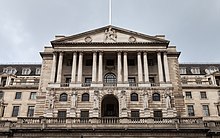
Back اقتصاد بعد-الكينزي Arabic Postkeynsçilik Azerbaijani Посткейнсианска икономика Bulgarian Economia postkeynesiana Catalan Postkeynesiánství Czech Post-keynesiansk økonomi Danish Postkeynesianismus German Escuela poskeynesiana Spanish اقتصاد پساکینزی Persian Jälkikeynesiläinen taloustiede Finnish
| Part of a series on |
| Economics |
|---|
| Part of a series on |
| Macroeconomics |
|---|
 |
| Part of a series on |
| Capitalism |
|---|
Post-Keynesian economics is a school of economic thought with its origins in The General Theory of John Maynard Keynes, with subsequent development influenced to a large degree by Michał Kalecki, Joan Robinson, Nicholas Kaldor, Sidney Weintraub, Paul Davidson, Piero Sraffa and Jan Kregel. Historian Robert Skidelsky argues that the post-Keynesian school has remained closest to the spirit of Keynes' original work.[1][2] It is a heterodox approach to economics.[3][4]
- ^ Skidelsky 2009, p. 42
- ^ Financial markets, money and the real world, by Paul Davidson, pp. 88–89
- ^ Lavoie, Marc (2006), "Post-Keynesian Heterodoxy", Introduction to Post-Keynesian Economics, Palgrave Macmillan UK, pp. 1–24, doi:10.1057/9780230626300_1, ISBN 9781349283378
- ^ Dequech, David (2012). "Post Keynesianism, Heterodoxy and Mainstream Economics". Review of Political Economy. 24 (2): 353–368. doi:10.1080/09538259.2012.664364. ISSN 0953-8259. S2CID 154188135.
© MMXXIII Rich X Search. We shall prevail. All rights reserved. Rich X Search